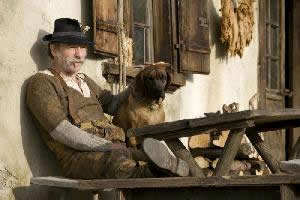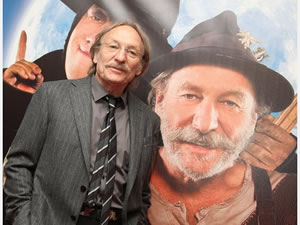De Britse dichter en schrijver Anthony Burgess werd geboren op 25 februari 1917 in Manchester, Engeland. Zie ook mijn blog van 25 februari 2007 en ook mijn blog van 25 februari 2008.
Uit: Revolutionary Sonnets
A dream, yes, but for everyone the same.
The thought that wove it never dropped a stitch.
The absolute was everybody’s pitch,
For, when a note was struck, we knew its name.
That dark aborted any wish to tame
Waters that day might prove to be a ditch
But then was endless growling ocean, rich
In fish and heroes till the dredgers came.
Wachet auf! A fretful dunghill cock
Flinted the noisy beacons through the shires.
A martin’s nest clogged the cathedral clock,
But it was morning: birds could not be liars.
A key cleft rusty age in lock and lock.
Men shivered by a hundred kitchen fires.
Going, Going, Gone
i know it is time to go
and go i must
so does it mean i don’t care,
questioning did I ever care
or was it fear that made stay so long
fear of starting over
fear on the unknown
but to stay i must to lie
lying is a cowardly trait
and i can not longer wear those shoes
they are much too small for my feet now
so with a kiss on the cheek
i taste the sadness of notorious love
and I’m gone
Anthony Burgess (25 februari 1917 – 22 november 1993)
De Franstalige schrijver Amin Maalouf werd geboren in Beiroet, Libanon, op 25 februari 1949. Zie ook mijn blog van 25 februari 2007 en ook mijn blog van 25 februari 2008.
Uit: In the Name of Identity (Vertaald door Barbara Bray)
“A life spent writing has taught me to be wary of words. Those that seem clearest are often the most treacherous. “Identity” is one of those false friends. We all think we know what the word means and go on trusting it, even when it’s slyly starting to say the opposite.
Far be it from me to want to keep on redefining the idea of identity. It has been the fundamental question of philosophy from Socrates’s “Know thyself!” through countless other masters down to Freud. To approach it anew today would call for more qualifications than I possess and for very much greater temerity. The task I set myself is more modest. I want to try to understand why so many people commit crimes nowadays in the name of religious, ethnic, national or some other kind of identity. Has it always been like this since time immemorial, or is the present era influenced by hitherto unknown factors? Sometimes what I say may seem rather simplistic. If so it’s because I want to set my argument out as calmly, patiently and fairly as possible, without resorting to jargon or unwarranted shortcuts.
What’s known as an identity card carries the holder’s family name, given name, date and place of birth, photograph, a list of certain physical features, the holder’s signature and sometimes also his fingerprints—a whole array of details designed to prove without a shadow of doubt or confusion that the bearer of the document is so-and-so, and that amongst all the millions of other human beings there isn’t one — not even his double or his twin brother — for whom he could be mistaken.”
Amin Maalouf (Beiroet, 25 februari 1949)
De Franse dichter Robert Rius werd geboren op 25 februari 1914 in Castle-Roussillon. Hij begon als journalist voor Catalan Coq in Perpignan, een satirsche weekblad in Perpignan. In 1937 kwam hij in contact met de groep surrealisten rond André Breton and Benjamin Péret. In die tijd schiep hij samen met Breton, Péret and Remedios Varo het stuk Le Jeu du dessin communiqué. In 1940 verscheen Frappe de l’Écho. Vanaf 1942 zat hij in het Franse verzet en publiceerde nog sporadisch (Essai d’un dictionnaire exact de la langue française, Serrures en friches en Picasso.) Op 4 juli 1944 werd hij gearresteerd, en daarna lang gefolterd. Hij weigerde echter te spreken en werd op 21 juli geëxecuteerd in Fontainebleau.
Œil-de-père
L’imagination-poil-de-chat
Mange tout
Rape voyelles
L’imagination peinte sang-de-bœuf
L’imagination à lorgnons
Qui a la flemme
Elle est dans un œuf
Se mange au couteau
Et se place à responsabilité illimitée
L’imagination cheval
Celle qui
Celle que l’on rôtit
Celle que Dominguez appelle petite colombe blanche
L’imagination ferme-portes
Décide de rester à croche-pied
L’imagination compresse sédative
L’imagination rail
L’imagination canevas
L’imagination croque-mots
Chutt
L’imagination rêve les bras croisés.
Robert Rius (25 februari 1914 – 21 juli 1944)
De Italiaanse schrijver en vertaler Aldo Busi werd geboren op 25 februari 1948 in Montichiari, Brescia. Gedurende zijn jonge jaren werkte hij veel buiten Italië. Zodoende leerde hij verschillende vreemde talen. Hij studeerde aan de universiteit van Florence en aan de universiteit van Verona, waar hij afstudeerde op een onderzoek naar de dichter John Ashbery. Busi debuteerde in 1984 met de roman Seminario sull gioventù (Ned: Over de jeugd). Intussen heeft hij al meer dan twintig titels op zijn naam staan. Busi is ook vertaler van werk van o.a. Lewis Caroll en Friedrich Schiller.
Uit: Seminario
„While contemplating the signs of Barbino’s first wet dream on his underwear that she has taken to the river, she comments: “Ah, youth, it is a great time for sowing seed.” And “sowing seed,” besides its sexual meaning, also refers to the seminarists whose underwear Lenta often washed, to the seminar which the grown-up Barbino will conduct on the anxieties of his youth, and to the literal meaning of “throwing seeds” which we may find grown one day.“
Aldo Busi (Montichiari, 25 februari 1948)
De Canadese schrijver Gérard Bessette werd geboren op 25 februari 1920 in Sainte-Anne-de-Sabrevois, Quebec en bezocht de Université de Montréal waar hij letterkunde studeerde. In die tijd verschenen ook zijn eerste gedichten. Hij brak door met zijn roman Le libraire uit 1960 over een bediende in een boekwinkel in een klein plaatsje in Quebec in de jaren vijftig. Voor zijn roman Le cycle (1971) kreeg hij de Governor General’s Award. In 1980 ontving hij de Prix Athanase-David, Quebec’s hoogste literaire onderscheiding. Gérard Bessette doceerde ook aan de Royal Military College of Canada en aan Queen’s University
Uit: Le libraire
„Ne rien faire
Quand il n’y a pas de chalands dans ma section et que mes rayons sont pleins, c’est le bon temps. Je m’installe sur un tabouret derrière le comptoir, les mains au menton, la visière rabaissée sur le nez, et je ne fais rien. J’attends l’heure de la fermeture, cinq heures et demie. Il est étonnant comme le temps passe vite quand on ne fait rien. Pourvu qu’on ne soit pas libre. Je veux dire : pourvu qu’un “devoir” vous force à rester en place. Autrement, ça ne tient plus. Ainsi moi, si je n’étais pas obligé de travailler à la librairie Léon pour gagner ma vie et qu’on me demandât de passer des heures d’affilée perché sur un tabouret, j’en serais complètement incapable.“
Gérard Bessette (25 februari 1920 – 21 februari 2005)
De Duitse dichter, schrijver, regisseur en acteur Franz Xaver Kroetz werd geboren op 25 februari 1946 in München. Daar bezocht hij de toneelschool en vervolgens het Max-Reinhardt-Seminar in Wenen. Bekend werd hij toen in 1971 de opvoeringen van zijn stukken Heimarbeit en Hartnäckig door neofascisten werden verstoord. In zijn rol van Baby Schimmerlos in de televisieserie Kir Royal werd Kroetz bij een groot publiek bekend. Kroetz ontving o.a. de Bertolt-Brecht-Literaturpreis, het Bundesverdienstkreuz en de Marieluise-Fleißer-Preis.
November
Tröste mich.
Dir hab ich mich
anvertraut.
Dir hab ich
meine Frauen geopfert.
Und meine Kinder
die kennen mich nicht.
Du hast meine Gesundheit.
Du hast meine Kraft.
Du hast meine Freunde.
Du hast vom Besten
von mir
alles.
Tröste mich
denn ich hasse dich.
Literatur.
Franz Xaver Kroetz (München, 25 februari 1946)
De Amerikaanse schrijfster Mary Chase werd geboren op 25 februari 1907 in Denver, Colorado. Na de universiteit werkte zij een tijd als journaliste tot zij in 1928 trouwde met de journalist Robert Lamont Chase. Als huisvrouw begon zij toneelstukken te schrijven. In 1944 kwam met Harvey de doorbraak. In 1945 kreeg zij er de Pulitzer Prijs voor. Het stuk werd alleen al in New York 1775 keer opgevoerd. Zij zelf schreef ook voor twee verfilmingen het draaiboek.
Uit: Harvey
(ELWOOD enters. MRS. CHAUVENET turns back to pick up her
scarf from chair, and sees him.)
MRS. CHAUVENET. (Rushing forward.) Elwood! Elwood Dowd! Bless your heart.
ELWOOD. (Coming forward and bowing as he takes her han
d.)
Aunt Ethel! What a pleasure to come in and find a beautiful woman waiting for me!
MRS. CHAUVENET. (Looking at him fondly.) Elwood—you haven’t changed.
VETA. (Moves forward quickly, takes hold of her.) Come along, Aunt Ethel—you mustn’t miss the party.
MYRTLE. There’s punch if you don’t like tea.
MRS. CHAUVENET. But I do like tea. Stop pulling at me, you two. Elwood, what night next week can you come to dinner?
ELWOOD. Any night. Any night at all. Aunt Ethel—I would be delighted.
VETA. Elwood, there’s some mail for you today. I took it up to your room.
ELWOOD. Did you, Veta? That was nice of you. Aunt Ethel- I want you to meet Harvey. As you can see he’s a Pooka. (Turn toward air beside him.) Harvey, you’ve heard me speak of Mrs. Chauvenet? We always called her Aunt Ethel. She is one of my oldest and dearest friends. (Inclines head toward space and goes “Hmm!” and then listens as though. not hearing first time. Nods as though having heard someone next to him speak.) Yes—yes—that’s right. She’s the one. This is the one. (To MRS. CHAUVENET.) He says he would have known you anywhere. (Then as a confused, bewildered look comes over MRS. CHAUVENET’S face and as she looks to L. and R. Of ELWOOD and cranes her neck to see behind him—ELWOOD not seeing her expression, crosses toward VETA and MYRTLE MAE.) YOU both look lovely. (Turns to the air next to him.) Come on in with me. Harvey—We must say hello to all of our friends—(Bows to MRS. CHAUVENET.) I beg your pardon. Aunt Ethel. If you’ll excuse me for one moment—(Puts his hand gently on her arm, trying to turn her.)

Mary Chase (25 februari 1907 – 20 oktober 1981)
De Oekraïense dichteres, schrijfster en vertaalster Lesja Oekrajinka werd geboren op 25 februari 1871 in Novograd-Volynsky. In 1881 werd kreeg zij te lijden aan tbc en begon zij uitgebreide reizen te maken op zoek naar genezing. Met haar bundels Na krylakh pisen (1893; “Eng: On the Wings of Songs”), Dumy i mriyi (1899; “Eng: Thoughts and Dreams”), and Vidhuky (1902; “Eng: Echoes”) vestigde zij haar naam als dichteres. Zij was actief in de strijd tegen het tsarisme en vertaalde in 1902 het Communistisch Manifest van Marx. In 1907 werd zij gearresteerd. Vanaf 1906 richtte zij zich meer op het schrijven van poëtisch drama, met verschillende historische achtergronden. Ukrainka schreef opok korte verhalen en essays en vertaalde werk van Homerus, William Shakespeare, Lord Byron, Victor Hugo, en Ivan Toergenjev.
Contra spem spero (Hope against hope)
Hence, dark thoughts! Away, ye autumn mists!
Golden spring is here, she’s here today!
Should my days of youth be spent in woe,
Drearily and sadly pass away?
Nay, through all my tears, I still will smile,
Sing my songs through troubles round me loom;
Hopeless, still hope on against all odds,
I will live! Away, ye thoughts of gloom!
On this hard and ingrate soil I’ll sow
Flowers that shall bloom with colors rare;
Flowers will I plant where frost doth reign,
Water them with many a bitter tear.
And these burning tears will soften then
All that ground so crusted, chill, malign,
Flowers, then perhaps, will bloom and bring
Joyous spring e’en to this heart of mine.
Though the mountain side be rough and steep,
Onward will I bear the ponderous stone;
Struggling upwards ‘neath the crushing load,
Still will I my joyous song intone.
Through the long, dark night inscrutable
Never will I close my wearied eyes,
Searching ever for guiding start –
Radiant empress of the midnight skies.
Yes, through all my tears, I still will smile,
Sing my songs through troubles round me loom;
Hopeless, still hope on against all odds,
I will live! Away, ye thoughts of gloom!
Lesja Oekrajinka (25 februari 1871 – 1 augustus 1913)
De Duitse schrijver Karl May werd geboren op 25 februari 1842 in Hohenstein-Ernstthal. Zie ook mijn blog van 25 februari 2007 en ook mijn blog van 25 februari 2008.
Uit: Kara Ben Nemsi im Reiche des Großherrn
““Es war Abend und wir lagerten am Rand eines Tschinarwaldes (Platenenwald). Über uns wölbte sich ein Himmel von solcher Reinheit, wie sie nur in diesen Gegenden zu beobachten ist. Wir befanden uns in der Nähe der persischen Grenze, und die Luft Persiens ist wegen ihrer Klarheit berühmt. Das Licht der Sterne war so stark, dass ich, obwohl der Mond nicht am Himmel stand, die Zeiger meiner Taschenuhr deutlich erkennen konnte. Zu lesen hätte ich, selbst bei kleiner Schrift, ganz gut vermocht. Sogar Gestirne, die gewöhnlich nur mit dem Fernrohr wahrgenommen werden können, kamen zum Vorschein. Der siebente Stern des Siebengestirns war ohne bedeutende Anstrengung des Auges zu erkennen. Die Klarheit eines solchen Sternenhimmels macht einen tiefen Eindruck auf das Gemüt, und ich begriff, warum Persien die Heimat der Astrologie ist, dieser unfrei geborenen Mutter der edlen Tochter, die uns mit den leuchtenden Welten vertraut macht.” –

Karl May (25 februari 1842 – 30 maart 1912)
Karl May als „Kara Ben Nemsi”, rond 1896
De Duitse dichter en filosoof Karl Wilhelm Rạmler werd geboren in Kolberg op 25 februari 1725. Vanaf 1798 washij hoogleraar logica aan de kadettenschool in Berlijn en vanaf 1790 theaterdirecteur van hhet Nationaltheater. Hij werd wegens zijn oden in antieke stijl wel de Duitse Horatius genoemd. Rạmler wordt gerekend tot de periode van de Verlichting, maar ook wel tot de Empfindsamkeit.
An den Frieden
Wo bist du hingeflohn, geliebter Friede?
Gen Himmel, in dein mütterliches Land?
Hast du dich, ihrer Ungerechtigkeiten müde,
Ganz von der Erde weggewandt?
Wohnst du nicht noch auf einer von den Fluren
Des Oceans, in Klippen tief versteckt,
Wohin kein Wuchrer, keine Missethäter fuhren,
Die kein Eroberer entdeckt?
Nicht, wo mit Wüsten rings umher bewehret,
Der Wilde sich in deinem Himmel dünkt?
Sich ruhig von den Früchten seines Palmbaums nähret?
Vom Safte seines Palmbaums trinkt?
O! wo du wohnst, laß endlich dich erbitten:
Komm wieder, wo dein süßer Feldgesang,
Auf heerdenvollen Hügeln und aus Weinbeerhütten
Und unter Kornaltären klang.
Sieh diese Schäfersitze, deine Freude,
Wie Städte lang, wie Rosengärten schön,
Nun sparsam, nun wie Bäumchen auf verbrannter Heide,
Wie Gras auf öden Mauern stehn.
Die Winzerinnen halten nicht mehr Tänze;
Die jüngst verlobte Garbenbinderin
Trägt, ohne Saitenspiel und Lieder, ihre Kränze
Zum Dankaltare weinend hin.
Denn ach! der Krieg verwüstet Saat und Reben
Und Korn und Most; vertilget Frucht und Stamm;
Erwürgt die frommen Mütter, die die Milch uns geben,
Erwürgt das kleine fromme Lamm.
Mit unsern Rossen fährt er Donnerwagen,
Mit unsern Sicheln mäht er Menschen ab;
Den Vater hat er jüngst, er hat den Mann erschlagen,
Nun fodert er den Knaben ab.
Erbarme dich des langen Jammers! rette
Von deinem Volk den armen Überrest!
Bind’ an der Hölle Thor mit siebenfacher Kette
Auf ewig den Verderber fest.
Karl Wilhelm Rạmler (25 februari 1725 – 11 april 1798)
Portret door Gottfried Hempel
De Duitse jezuïet en dichter Friedrich von Spee werd op 25 februari 1591 in Kaiserswerth bij Düsseldorf geboren. Zie ook mijn blog van 25 februari 2007 en ook mijn blog van 25 februari 2008.
Zu dir auß tieffem grunde
Zu dir auß tieffem grunde
Hab ich geruffen, Herr:
Ach höre mich zur-stunde,
Nit bleibe doch so ferr.
So du die zahl der sünden
Villeicht wolst schawen an,
Wer würd ohn schanden könden
Vor deinen augen stahn?
Ein gnaden Meer verschloßen
In deinem hertzen ligt,
Das komt mit hauff gefloßen,
Wan vns die noth anficht:
Drumb nie will ich verzagen,
Auff ihn will harren fäst,
Wan mich bey trüben tagen
Schon liecht, vnd glantz verläst.
Ach Israël mich höre,
Was dir von hertzen rath;
Kein vngemach dich störe,
Nit zage früh, noch spath:
Wan sich der tag entzündet
Zur ersten morgen-wacht,
Dein hoffnung sey gegründet
Auff Gott, biß in die nacht.
Auff ihn wer sich geleinet
Mit festem helden-mut,
Die gnad ihm bald erscheinet,
Der streit kompt ihm zu gut.
Dan vnser Gott so milde,
Voll süß- vnd gütigkeit,
All vnser schutz, vnd schilde
Verbleibt in Ewigkeit.
Friedrich von Spee (25 februari 1591 – 7 augustus 1635)
Standbeeld in Paderborn
De Italiaanse toneelschrijver Carlo Goldoni werd geboren in Venetië op 25 februari 1707. Zie ook mijn blog van 25 februari 2007.
Uit: Der Diener zweier Herren
“Pandolfo, Doktor Lombardi, Tebaldo.
DOKTOR. Hier haben sie meine Hand – es bleibt dabei.
Sie schlagen ein.
PANDOLFO. Es bleibt dabei. – Heute Verlobung und morgen Hochzeit. Unser junges Volk ist so ineinander verliebt, daß sie uns gern die weitläufigen Vorbereitungen und Zeremonien schenken werden. – Sie sollen Zeuge sein, alter Krugvater!
TEBALDO. Viel Ehre!
PANDOLFO. Man kann wohl sagen, hier hat der Himmel seine Hand im Spiele gehabt. Ohne den plötzlichen Tod des jungen Rasponi wären wir wohl nie Schwäger geworden.
DOKTOR. Accidit in puncto –
TEBALDO. Was? der junge Rasponi ist tot?
PANDOLFO. Tot! – Er ist ermordet worden – in einer Gesellschaft wilder junger Leute – der Liebhaber seiner Schwester, den er nicht leiden konnte, war auch dabei. – Ich weiß die eigentliche Geschichte nicht; aber tot ist er.
TEBALDO. Der arme brave junge Mensch!
PANDOLFO. Haben Sie ihn gekannt?
TEBALDO. Wie das Mutterfäßchen in meinem Keller. Ich habe vier Jahre in Turin gewirtschaftet, und er war mein täglicher Gast. Ich hab’ auch seine Schwester gekannt, ein prächtiges Mädchen! nur zu männlich erzogen. Sie trieb alle Übungen ihres Bruders. – Wer hätte das denken sollen!
PANDOLFO. Sie wird sich wohl trösten; des Bruders Tod macht sie zu einem sehr reichen, unabhängigen Mädchen. Aber daß wir nicht vergessen, warum ich Sie herbitten ließ. – Wir wollen das Hochzeitsmahl bei Ihnen einnehmen. Treffen Sie Anstalten! Nicht prächtig, aber gut.
Carlo Goldoni (25 februari 1707 – 6 februari 1793)
Portret door Alessandro Longhi)
De Duitse dichter en mysticus Quirinus Kuhlmann werd geboren op 25 februari 1651 in Breslau. Hij studeerde rechten in Jena, maar leidde daarna een reizend leven omdat hij geloofde dat hij zijn door de Heilige Geest ingegeven visioenen moest openbaren. Zijn hoofdwerk Kühlpsalter (1684-1686) is een dichterlijke autobiografie waarin hij het einde van de wereld aankodigde. Op een reis naar Rusland werd hij gearresteerd en als ketter levend verbrand.
Uit: Der Kühlpsalter
Der 1. Gesang
Als er zum Davidisiren unter geistlicher Anfechtung getriben ward in Jehna, dahin er von Breslau den 20 Septemb. 1670 ausreisend, 15 Monden nach seinem Erleuchtungsmay 1669, über Lignitz, Buntzlaw, Görlitz, Leipzig, Lützeu, Naumburg im October ankommen.
1.
Libhold ging unlängst spatziren
Um zukleinern seinen schmertz:
Trauren wolte ihn berühren,
Hoch verwundet ward sein Hertz.
Ach wär ich aus Sünd und Erden!
Sang der seufftzervoller Mund:
Mus ich dann verschlungen werden
Von dem grausen Abgrundschlund?
2.
Seit mein Jesus weggeschiden,
Seit schid aller Segen hin.
Unruh küsset mich vor Friden:
Seelenschade stat Gewin.
Löse, Jesus, meine Banden,
Drein ich selber mich vernetzt!
Wo nicht Hülfe mir verhanden,
Leb ich ewiglich verletzt.
Quirinus Kuhlmann (25 februari 1651 – 4 oktober 1689)

























